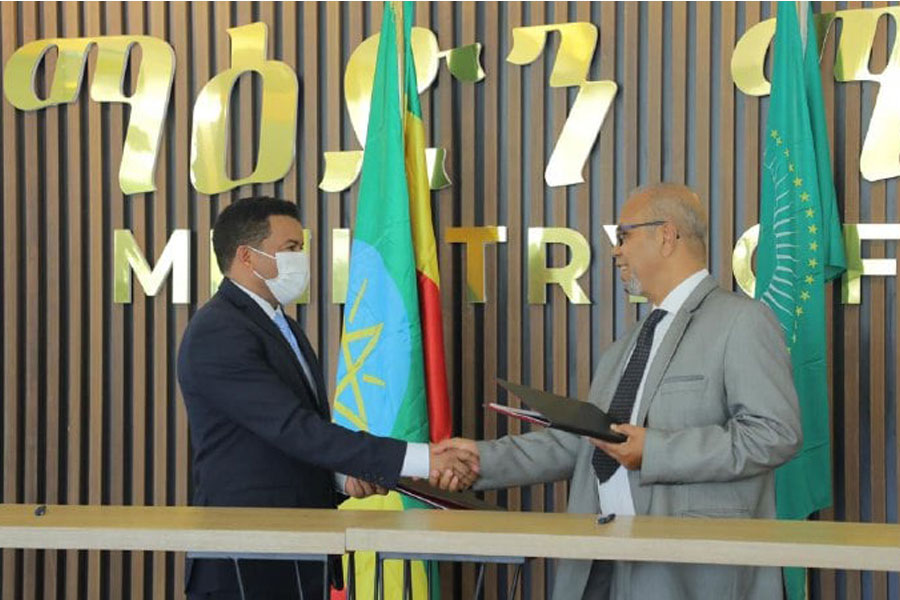
Radar | Jul 25,2020
Sep 6 , 2020
By GELILA SAMUEL ( FORTUNE STAFF WRITER
)
The Ministry of Finance has started conducting a nationwide study on the salary rates of project employees, those working at government offices under the payroll of international organisations. The study was initiated after a high turnover rate of project employees due to a pay gap caused problems at some institutions.
Supervised by Yasmin Wohabrebbi, state minister for Finance, the committee formed to assess the salaries has concluded its data collection from different offices and is set to move on to the analysis stage. Along with the committee, the Ministry has hired external consultants for the study.
"This high turnover of employees has been affecting the performance of projects," said Yasmin. "The turnover of project employees appeared across different projects and sectors."
Though the financing for the salaries of project employees has its own defined procedure, the government needs to have its own manual to address existing gaps and improve the performance of projects, according to the state minister.
Half a year ago, the Ministry of Agriculture conducted a similar study and observed similar problems. This was done through a committee of 10 members that included project employees chaired by the human resource director. The committee had taken different offices as samples including the ministries of Trade & Industry, Innovation & Technology, Urban Development & Construction, Health and Peace, as well as the Industrial Parks Development Corporation.
"We noticed the need for a salary raise for project employees after we witnessed a disparity across other ministries," said Keberu Belayneh, coordinator of the Agricultural Growth Programme.
The assessment found that project employees at the Ministry of Agriculture were paid on the low end of the salary bar when compared with other ministries and government offices.
A project manager or coordinator used to get paid a 27,000 Br monthly salary at the Agricultural Ministry. However, the Ministry found out that project managers or coordinators at the Ministry of Trade & Industry were getting paid 56,980 Br a month, the highest from the sample, and 34,000 Br, the lowest, at the Ministry of Peace and the Urban Productive Safety Net Project.
A lot of project employees left the Ministry, especially this year, according to Jemal Ali, project coordinator for the Drought Resilience & Sustainability Programme.
"It was hard to replace them," he said. "We couldn't afford them compared to the market standard."
The study, which was approved by executives at the Ministry in March, came after complaints were filed, according to Jemal.
Taking the average from the samples, salaries were revised and a project manager or coordinator at the Ministry's salary was raised to 45,000 Br.
"The real question is whether we can maintain project employees at this rate," he added.
Donors had also raised similar issues, according to Tessema Gebermedhine, chief of staff at the Ministry of Agriculture. Donors to the Ministry include the World Bank and KfW, a German state-owned development bank based in Frankfurt.
The assessment of the salaries of project employees also included categorising project employees into three categories. This was done based on the project implementation area, the focus group of the project, components of the project, resources for the project, number of donors, project application area, and the number of employees for the project.
In July, however, Ahmed Shide, the minister of Finance, wrote a letter to the Ministry revoking the new salary scale until the assessment is concluded. However, the revocation was lifted until the Finance Minister is done with the study.
The Agriculture Ministry does not believe reverting back to the old salary scale would be a wise administrative move but will wait until after the completion of the study by the Finance Ministry for any readjustments, according to Tessema.
Teshome Bekele, a lecturer in the department of management at Addis Abeba University's School of Business & Economics, argues that the salaries of project employees in Ethiopia are overvalued.
"There is a need for the government to reassess it by taking a step back, because it doesn't reflect the market price," he said. "This is why the government is currently facing a problem."
PUBLISHED ON
Sep 06,2020 [ VOL
21 , NO
1062]

Radar | Jul 25,2020

Fortune News | May 21,2022

Radar | Jun 12,2021

Radar | Mar 25,2023

Fortune News | Jan 15,2022

Radar | May 25,2024

Radar |

Fortune News | Jan 07,2023

Commentaries | Dec 23,2023

Radar | Jul 24,2023

Dec 22 , 2024 . By TIZITA SHEWAFERAW
Charged with transforming colossal state-owned enterprises into modern and competitiv...

Aug 18 , 2024 . By AKSAH ITALO
Although predictable Yonas Zerihun's job in the ride-hailing service is not immune to...

Jul 28 , 2024 . By TIZITA SHEWAFERAW
Unhabitual, perhaps too many, Samuel Gebreyohannes, 38, used to occasionally enjoy a couple of beers at breakfast. However, he recently swit...

Jul 13 , 2024 . By AKSAH ITALO
Investors who rely on tractors, trucks, and field vehicles for commuting, transporting commodities, and f...

Oct 25 , 2025
The regulatory machinery is on overdrive. In only two years, no fewer than 35 new pro...

Oct 18 , 2025
The political establishment, notably the ruling party and its top brass, has become p...

Oct 11 , 2025
Ladislas Farago, a roving Associated Press (AP) correspondent, arrived in Ethiopia in...

Oct 4 , 2025
Eyob Tekalegn (PhD) had been in the Governor's chair for only weeks when, on Septembe...